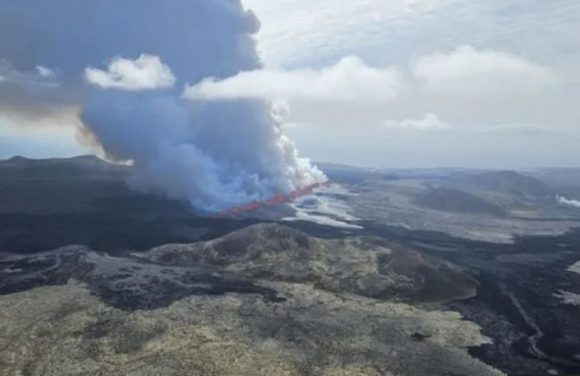
A volcanic eruption has commenced in southwest Iceland, prompting the evacuation of the renowned Blue Lagoon spa and the fishing town of Grindavik. The new fissure, which is over 2.5 km (1.5 miles) long and growing, opened near Sundhnuksgigar on the Reykjanes Peninsula, marking the fifth eruption in the region since December.
The Icelandic Meteorological Office (IMO) reported the fissure’s significant length, while authorities declared a state of emergency. Despite the severity, air travel to and from Iceland remains unaffected. Grindavik’s mayor, Fannar Jónasson, expressed concern about the substantial volume of lava advancing toward the town, surpassing previous eruptions in magnitude. As a safety measure, energy provider HS Veitur cut off power to Grindavik.
Local media reported that three individuals refused to evacuate. Authorities strongly urged all residents and visitors to leave Grindavik and move to a safe distance. Currently, only one road out of the town remains accessible.
Dramatic footage from the eruption site showed molten rock spewing up to 50 meters high and extensive ash clouds darkening the sky. Benjamin Hardman, a natural history cinematographer documenting Iceland’s volcanoes, described the experience as surreal.
Officials noted the magma intrusion is nearing Grindavik, and the Svartsengi power plant, crucial for providing electricity and water to the peninsula, has also been evacuated. Barriers have been erected to shield the power plant, Grindavik, and the Blue Lagoon from lava flows.
Despite the eruption, Keflavik International Airport continues normal operations. Prior to the eruption on Wednesday, “intense earthquake activity” was recorded. Geophysicist Ari Trausti Gudmundsson indicated that scientists had anticipated this eruption.
Most of Grindavik’s 4,000 residents were evacuated permanently in November, following eruptions over the past months that saw lava inundate the town’s streets in January, destroying three homes. Some residents had returned to safer neighborhoods.
Iceland, located on the Mid-Atlantic Ridge, has 33 active volcanic systems. The last significant volcanic activity on the Reykjanes Peninsula occurred 800 years ago, lasting for decades. Since 2021, this marks the eighth eruption, suggesting the area might be entering a prolonged volcanic period that could span decades or centuries.
Picture Courtesy: Google/images are subject to copyright
